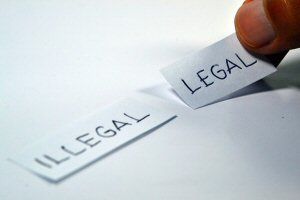Why offshore online gambling is legal in Canada, despite provincial government claims to the contrary.
 Canada’s largest, most populated provinces promote an internet gambling product. British Columbia, Manitoba, Ontario and Quebec present a wide variety of gambling opportunities (lottery, casino, poker and/or bingo), while the provinces of Atlantic Canada offer access to online lotteries. There’s no question as to the legality of these ring-fenced website.
Canada’s largest, most populated provinces promote an internet gambling product. British Columbia, Manitoba, Ontario and Quebec present a wide variety of gambling opportunities (lottery, casino, poker and/or bingo), while the provinces of Atlantic Canada offer access to online lotteries. There’s no question as to the legality of these ring-fenced website.
What about internationally regulated gaming sites? The ones licensed and headquartered overseas. Not just any old operators, but the big ones, like 888, LeoVegas, PartyPoker and Royal Vegas Casinos. What’s the real legal status on these websites?
Canadian provinces say they’re illegal. Australia also says they’re illegal. Most of the United States agree, they’re illegal. So why is it that so many of these respected, internationally regulated gambling websites have withdrawn from the US and Australia, but continue to accept Canadian players?
Is Offshore Online Gambling Legal in Canada or Not?
Provincial governments love to claim that offshore gambling websites are “illegal”. They toss the word around like a hot potato, spitting it out there and then backing away quickly, before anyone tries to question its accuracy. Others may avoid the word “illegal”, instead implying that offshore gambling websites are illegal by stating that only Canada’s provincially regulated sites “are legal”.
The British Columbia Lottery Corp is a perfect example. The very title of BCLC’s home-grown gaming site, PlayNow.com, is, “BC’s Only Legal Gambling Website”. Wouldn’t this imply that all other gambling sites are illegal in British Columbia?
However, when we do a little more digging on PlayNow.com, we find an enlightening clarification of that title:
“Of the roughly 2,000 unregulated internet gambling websites available to players, PlayNow.com is the only legal website operated specifically for British Columbians.”
Ah-ha! It’s not the only legal gambling website. It’s just the only legal one that’s “specifically for British Columbians”, and no one else.
Still not sure if online gambling is really legal? Just ask the government of Quebec. They’ve spent years trying to make online gambling at offshore websites illegal. They actually passed a law that gave them permission to enforce an IP block against gambling websites that aren’t licensed in Quebec. Needless to say, that was it was challenged by federal agencies and the shot down the Supreme Court.
Difference Between Canadian, Australian and US Laws
Getting back to the original question—why do online gambling operators respect the authority of US and Australian laws, but not the word of Canadian politicians? Because that’s exactly what it is—written laws, etched into stone, versus words, with no legislative power to back them up.
In the US and Australia, there are state and federal laws expressly prohibiting certain forms of gambling activity. The US gives each state the script its own laws in regards to gambling. Those that script explicit laws criminalizing online gambling, or offshore operators without a local license, are truly illegal.
In Australia, legislative action was taken to outlaw online casino and poker games altogether, as well as in-play sports betting and wagering on credit. Only traditional racing and sports gambling is legal online, and only operators that are licensed and regulated in Australia are able to provide that to Australians.
Not only is any other form of internet gambling expressly illegal, additional measures of enforcement are applied that give Australia the authority to heavily punish offenders. Any online gaming site that violates the laws can be fined a staggering $8 million per day!
And that, my friends, is why online gambling is legal in Canada. Legislation here is weak. The last time federal gambling laws were updated was 1985, more than a decade before the launch of the first online casino. No updates are being made, because it’s too big of a job.
The federal government isn’t giving provinces the right to set their own rules in this area, as they have with land-based gambling, because the first thing they would do is create a legal monopoly—just as Quebec tried to do on its own. Net neutrality laws won’t allow for that. So instead, they leave it alone, setting it on a far back burner to deal with some other day. So long as Canadians aren’t complaining, they can put it off. And why should we? We have lots of viable options now—far more than we’d have if the provincial governments got their way.





